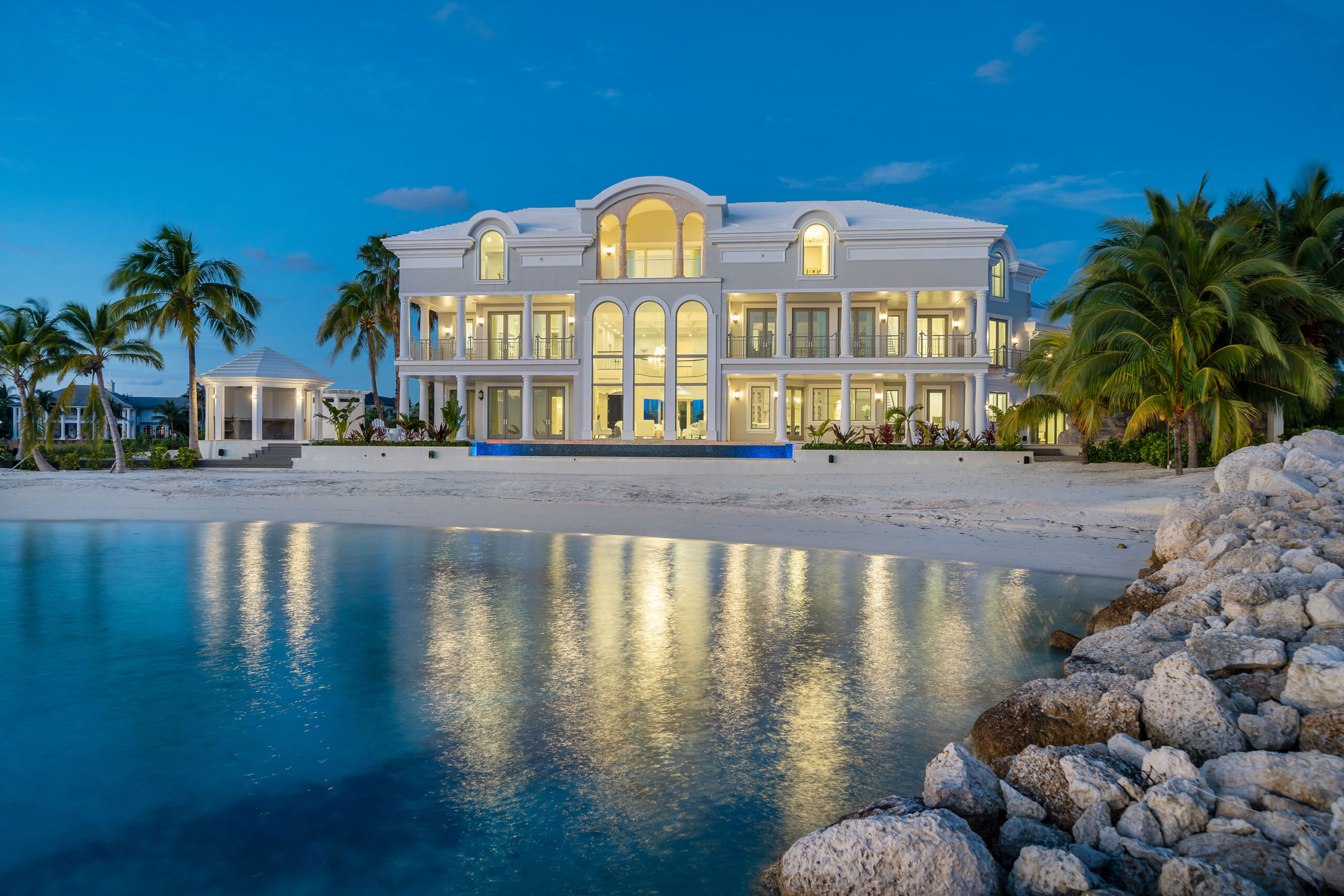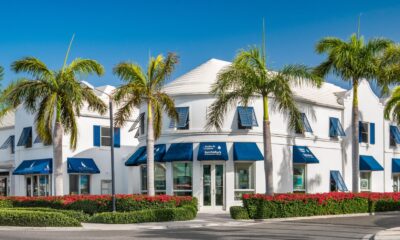Caribbean News
World’s wealthiest expected to bid on Paradise Island Showpiece, $28+ Million Waterfront Home Opens for Bidding on Sotheby’s Concierge Auctions Website March 10
Published
3 years agoon

#TheBahamas, February 27, 2023 – Elisium, a 20,000-square-foot, 9-bedroom, 11-bath show-stopping, jaw-dropping residence in Ocean Club Estates on Paradise Island in The Bahamas, is expected to draw a fiercely competitive field of bidders when the bidding officially opens, without reserve, on March 10 via Sotheby’s Concierge Auctions. 
A spokesman for Sotheby’s Concierge Auctions, the world’s largest luxury real estate auction marketplace, said they have already seen interest in the never-before-lived-in estate.
“It’s extremely encouraging to see so much early interest in a property weeks before the auction even opens for bidding,” said Danny Prell, Vice President, Business Development.
“The answer to early interest lies partly in the property itself, but additionally in its premier location,” says Prell, an opinion shared by Christopher ‘CJ’ Ansell, the local cooperating broker for the sale.
“The property known as Elisium is a one-of-a-kind offering,” said Ansell, whose performance earned him Circle of Excellence status at Nassau-based Damianos Sotheby’s International Realty in 2022.
“The estate, not only beautiful in and of itself with exquisite attention to detail around every turn, is also the only residence in the famed Ocean Club Estates that enjoys both a harbour and ocean view and the only property with both marina basin dock and private beach. There is absolutely no other property like it.”
The attention to detail Ansell notes begins from the moment of entry, where individuals step onto perfectly polished and seemingly seamless porcelain floors that appear as is if they are floating. The 28-foot-high arched windows frame crystal blue waters, and sky lighting up the entry living area soaks the space in natural light.
“That light alone and the clean, inviting whites in the furniture paired with dark wood trim adds a touch of contrast,” says Ansell. “It sets the tone for the rest of the experience with the space telling a story that says immediately, ‘You are in The Bahamas, welcome home to a world of light and beauty.”
If Ansell waxes eloquent on the property, it’s hard not to.
“A labor of love, the current owners spent four years constructing what was meant to be their forever home. With a keen eye for fine details and personal touches, the owners’ taste for luxury design is sure to benefit the next buyer.”
Those personal touches are evident from the moment you enter the gated estate. Leading to the front door is a boardwalk over a saltwater pond, stocked with starfish, jellyfish, and other species. Massive double doors open to an entryway with two 11-foot-high aquariums, and from there, the uninterrupted vistas fill your senses.
“The kitchen is so untouched that no one has ever even had a cup of coffee in it,” says Ansell, while opening the doors of two dishwashers, a wall-length concealed Subzero fridge and freezer, a chef’s stove, and microwaves, revealing operations manuals still in their cellophane wrappers.
Twin staircases lead to the second floor joining at a landing with another magazine-worthy view. An intimate dining area for up to eight persons is situated just off the elevator leading to the second floor. Two thickly carpeted, self-sufficient suites are accessible by stairs or elevator.
The third floor is devoted to a full-on breathtaking primary suite as well as a smaller space, poised as a nursery or private office. That attention to detail shines yet again in even in the bathrooms with flowing grains of marble matching to perfection through bends, corners, and rounds, reflecting the master craftsmanship.
“You see that excellence again and again,” says Ansell, “throughout the supersized closets with finely detailed, extensive built-ins. You see it in the bathrooms with his and her dressing spaces, extravagant free-standing tubs, radiant heated towel bars, and the stamped Elisium name.”
Outdoors, the property showcases two swimming pools, one specifically designed with a faux coral climbing area, a private beach, and a separate play area for kids and their parties.
According to Prell, while the estate and its features are in a class of their own, Elisium’s location puts it on the global map.
“From the moment the first lots were sold in the late 1990s to today—almost 25 years later—Ocean Club Estates has not only retained its place in the somewhat rarefied air of the most desirable places on earth to live, the properties have consistently appreciated in value,” said Prell. “Access to Four Seasons Ocean Club, Atlantis resorts, automatic approval for the Ocean Club membership privileges for those who wish to join, and the amenities in the Estates community itself—golf, tennis, restaurants—make it the luxury location of choice.”
The bidding officially opens on March 10 on casotheby’s.com, and, while listed at $28.8 million, the estate is being offered without reserve.
For even more Caribbean luxury, view Sotheby’s Concierge Auctions’ additional offerings, including a 3-bedroom tower villa with 360-degree mountain & Caribbean ocean views in St. Vincent & The Grenadines, a private 186-acre Bahamian island chain with development potential, or an exclusive villa boasting with extensive indoor and outdoor living spaces, set in Sundance Ridge on St. Kitts.
Photo Captions:
Header: Interest is already being shown well ahead of the opening date of March 10 for online bidding via Sotheby’s Concierge Auctions on the Elisium estate, a 20,000 square foot showpiece of stunning design and master craftsmanship in world-renowned Ocean Club Estates, Paradise Island, Bahamas.
1st insert: The 28-foot high windows fill the entry living area with light, providing a sense of place and an invitation to breathe deeply and unwind. Light fills nearly every space at Elisium, the 20,000 square foot, 9-bedroom, 11-bath estate in Ocean Club Estates, Paradise Island, Bahamas, that goes on auction via Sotheby’s Concierge Auctions March 10.
2nd insert: Elisium baths reflect stunning design tails and master craftsmanship that explain its $28.8 million valuation. Note the perfection in flowing marble around corners, bends and throughout the walls. Interest in the never-lived-in grand estate is already being shown ahead of online bidding that starts March 10 via Sotheby’s Concierge Auctions.
3rd insert: One of two pools at Elisium, Paradise Island, the lagoon pool with rock and boulder wall overlooks the water and private beach while a second expanded lap pool runs the length of the main house.
You may like
-


TOURISTS & LOCALS REJOICE: BIG INVESTMENTS SURGE IN BAHAMIAN DESTINATIONS
-


CLAUDIO’S BAHAMAS OPENS AT ATLANTIS PARADISE ISLAND
-


‘Incredible Environment’ for Real Estate continues for Turks and Caicos
-


Q1 Real Estate for 2023 lagging, but not by far
-


TCI Real Estate Market Skyrockets in Q1; $128 MILLION in transactions
Caribbean News
Seven Days. Seven Nations. One Storm — Hurricane Melissa
Published
3 months agoon
November 1, 2025
A week of wind, water, and heartbreak
From Haiti’s hillsides to Bermuda’s reefs, seven Caribbean nations have been battered, bruised, and forever marked by Hurricane Melissa — a storm that tested not only the region’s infrastructure but its unshakable spirit of unity.
Saturday–Sunday, October 25–26 – The First Strike: Hispaniola
Before the storm even earned its name, torrential rain and flash floods swept across Haiti and the Dominican Republic, claiming lives and tearing through rural communities.
tearing through rural communities.
In southern Haiti, rivers burst their banks, swallowing roads and homes; 23 people were confirmed dead by Sunday evening. Across the border, one death was reported in the Dominican Republic as swollen rivers cut off villages in Barahona and Pedernales.
By nightfall, the tropical system had strengthened — and the Caribbean knew it was facing something historic.
Monday, October 27 – Evacuations and Airlifts
In The Bahamas, Prime Minister Philip Davis issued a mandatory evacuation for the MICAL Islands — Mayaguana, Inagua, Crooked Island, Acklins, Long Cay, and Ragged Island.
Bahamasair added extra flights as the nation braced for what forecasters warned could become the strongest storm in nearly two decades.
Meanwhile, Jamaica, Turks & Caicos, and Cuba activated their national emergency operations centers.
Tuesday, October 28 – Jamaica and Haiti Hit Hard
By afternoon, Hurricane Melissa made landfall near St Elizabeth, Jamaica, as a Category 5 hurricane — winds of 185 mph, central pressure 892 mb, the lowest ever recorded so close to the island.
Roads collapsed, bridges washed away, and Black River Hospital lost its roof. Power failed for 72 percent of the island.
BOJ TV footage shows split asphalt, sparking lines, and flooded communities abandoned for safety.
Initially four were reported dead, that grew to seven deaths and heavy damage in 170 communities; Andrew Holness, Jamaican Prime Minister calling it “a national test of resilience.”
Haiti, still recovering from the weekend’s flooding, was hit again as outer bands dumped more rain on Les Cayes and Jacmel, deepening the humanitarian crisis.
Wednesday, October 29 – Crossing to Cuba
Weakened slightly to Category 4 (145 mph), Melissa tracked north-northeast at 8 mph, hammering eastern Cuba with hurricane-force winds
and mudslides. Over 15 000 people were evacuated from Santiago de Cuba and Holguín.
In Turks & Caicos, the Regiment deployed to Grand Turk, Salt Cay, South, North and Middle Caicos, preparing shelters and securing public buildings.
Thursday, October 30 – The Bahamas and the All Clear
Melissa’s speed increased, sparing the northern Caribbean its worst.
The Bahamas Airport Authority closed 13 airports from Mayaguana to Exuma International; none reported casualties, though infrastructure suffered.
In Turks & Caicos, the all-clear came early Thursday after minimal impact. Premier Washington Misick expressed gratitude and pledged support for neighbors:
“We must act — not only with words, but with compassion and deeds.”
Friday, October 31 – Counting the Cost
By Friday, Melissa had weakened to Category 3 (120 mph) north of Cuba.
The Bahamas Department of Meteorology issued its final alert, lifting warnings for the southern islands.
Regional toll:
- Haiti: 23 dead, thousands displaced.
- Jamaica: 7 dead, 170 communities damaged; 72% without electricity
- Cuba: 2 dead, 15, 000 evacuated.
- Dominican Republic: 1 dead, flooding in southwest.
- Bahamas: 0 dead, minor infrastructure damage and flooding in southeast.
- Turks & Caicos: minimal to no impact.
Relief and Reconnection
The Cayman Islands became the first government to touch down in Jamaica post-storm. Premier Juliana O’Connor-Connolly led a contingent bringing a plane-load of essentials and pledged US $1.2 million in aid.
Reggae icon Shaggy arrived on a private jet with friends, delivering food, medical kits, and hygiene supplies.
Meanwhile, Starlink and FLOW Jamaica activated emergency satellite internet across Jamaica providing free connectivity through November.
From overseas, U.S. President Donald Trump, speaking during his Asia tour, announced that American search-and-rescue teams and disaster aid will support the region.
“They can depend on U.S. assistance as they recover from this historic storm,” he said.
Faith, Funds, and False Websites
The Government of Jamaica and the Sandals Foundation have both launched verified donation portals for recovery. Officials are warning against fake crowdfunding pages posing as relief sites and urging donors to use only official channels.
A Seventh Nation in the Crosshairs – Bermuda
As Hurricane Melissa left the Caribbean basin, Bermuda found itself next in line.
Forecasts indicated the storm would pass just west of the island late Thursday into Friday, likely as a Category 1 to 2 hurricane with sustained winds near 105 mph.
Though far weaker than when it ravaged Jamaica, officials issued a hurricane warning, urging residents to secure property and expect tropical-storm conditions.
By all appearances Bermuda is heeding the warnings
The Human Response
Across the Caribbean, solidarity surged.
The Global Empowerment Mission (GEM) in Miami began airlifting relief supplies, while churches, civic groups, and businesses in The Bahamas and Turks & Caicos organized drives for displaced families.
“Your dedication gave our islands the strength to face the storm,” Premier Misick said. “Together, as one Caribbean family, we will rise stronger.”
Resilience in the Wake
Melissa’s winds may have faded, but her impact endures. Engineers are inspecting bridges, hillsides, and water systems; volunteers are clearing debris and distributing aid in communities still cut off.
From Haiti’s ravaged river valleys to Jamaica’s sugar towns, from Cuba’s eastern hills to The Bahamas’ salt ponds and Bermuda’s reefs, the region once again stands at the crossroads of ruin and renewal — and leans, as always, toward hope and a faithful God
Caribbean News
Haitian Pushback Halts Controversial Constitution Rewrite — What’s Next?
Published
3 months agoon
October 15, 2025
Deandrea Hamilton | Editor
Haitian media, legal scholars and civic voices did what bullets and barricades couldn’t: they stopped a sweeping constitutional overhaul widely branded as anti-democratic. Editorials and analyses tore into proposals to abolish the Senate, scrap the prime minister, shift to one-round presidential elections, expand presidential power, and open high office to dual-nationals—a package critics said would hard-wire dominance into the executive at a moment of near-lawless insecurity.
The Venice Commission—Europe’s top constitutional advisory body—didn’t mince words either. In a formal opinion requested by Haiti’s provisional electoral authorities, it pressed for clear legal safeguards and credible conditions before any referendum, including measures to prevent gang interference in the electoral process—an implicit rebuke of pushing a foundational rewrite amid a security collapse.
Facing that drumbeat, Haiti’s Transitional Presidential Council has now formally ended the constitutional-reform initiative. The decision, taken at a Council of Ministers meeting at the National Palace, effectively aborts the rewrite track that has haunted Haiti since the Moïse and Henry eras.
So what now? Per the Miami Herald, the pivot is back to basics: security first, elections next. That means stabilizing Port-au-Prince enough to run a vote, rebuilding the electoral timetable, and empowering the provisional electoral machinery—none of which is simple when gangs control vast chunks of the capital and state authority remains fragile. Recent headlines underline the risk: gunfire has disrupted top-level government meetings, a visceral reminder that constitutional theory means little without territorial control.
Bottom line: Haitian journalists and public intellectuals helped slam the brakes on a high-stakes centralization of power that lacked legitimacy and safe conditions. International constitutional experts added weight, and the transition authorities finally conceded reality. Now the fight shifts to making an election possible—clean rolls, secure polling, and credible oversight—under circumstances that are still hostile to democracy. If the state can’t guarantee basic safety, any ballot is theater. If it can, shelving the rewrite may prove the first real step back toward consent of the governed.
Caribbean News
Political Theatre? Caribbean Parliamentarians Walk Out on House Speaker
Published
3 months agoon
October 14, 2025
By Deandrea Hamilton | Magnetic Media
October 14, 2025 – It’s being called political theatre — but for citizens, constitutional watchdogs, and democracy advocates across the Caribbean, it feels far more serious. Within a single week, two national parliaments — in Trinidad and Tobago and St. Kitts and Nevis — descended into turmoil as opposition members stormed out in protest, accusing their Speakers of bias, overreach, and abuse of parliamentary procedure.
For observers, the walkouts signal a deeper problem: erosion of trust in the very institutions meant to safeguard democracy. When Speakers are viewed as political enforcers instead of neutral referees, parliaments stop functioning as chambers of debate and start performing as stages for power and spectacle — with citizens left wondering who, if anyone, is still accountable.
October 6: St. Kitts Parliament Erupts
The first walkout erupted in Basseterre on October 6, 2025, when Dr. Timothy Harris, former Prime Minister and now Opposition Leader, led his team out of the St. Kitts and Nevis National Assembly in a protest that stunned the chamber.
led his team out of the St. Kitts and Nevis National Assembly in a protest that stunned the chamber.
The flashpoint came as the Speaker moved to approve more than three years’ worth of unratified parliamentary minutes in one sitting — covering 27 meetings and three national budgets — without individual review or debate.
Dr. Harris called the move “a flagrant breach of the Constitution and parliamentary tradition,” warning that the practice undermines transparency and accountability. “No serious parliament can go years without approving a single set of minutes,” he said after exiting the chamber.
The Speaker defended the decision as administrative housekeeping, but critics were unconvinced, branding the move a “world record disgrace.” The opposition’s walkout triggered renewed calls for the Speaker’s resignation and sparked a wider public discussion about record-keeping, accountability, and respect for parliamentary norms in St. Kitts and Nevis.
October 10: Trinidad Opposition Follows Suit
Four days later, on October 10, 2025, the Opposition United National Congress (UNC) in Trinidad and Tobago staged its own walkout from the House of Representatives in Port of Spain.
The UNC accused the Speaker of partisan bias, claiming she had repeatedly blocked urgent questions, ignored points of order, and allowed government members to breach standing orders without consequence.
“The Speaker has failed in her duty to act impartially,” the Opposition declared in a statement. “Parliament is not the property of any political party or Presiding Officer.”
The dramatic exit was seen as a culmination of months of rising tension and frustration, with opposition MPs arguing that parliamentary rules were being selectively applied to silence dissenting voices.
Political analyst Dr. Marcia Ferdinand described the twin walkouts as “a warning sign that parliamentary democracy in the Caribbean is teetering on the edge of performative politics.”
“When chairs become political shields rather than constitutional referees,” she said, “democracy becomes theatre, not governance.”
A Pattern Emerging
While St. Kitts and Trinidad are very different political environments, both incidents point to the same regional fault line: the perception that Speakers — the guardians of parliamentary order — are no longer impartial.
In Westminster-style systems like those across the Caribbean, the Speaker’s authority depends not on power but on public confidence in fairness. Once that credibility erodes, parliamentary control collapses into confrontation.
Governance experts say the implications are serious: eroded trust between government and opposition, declining public confidence in state institutions, and growing voter cynicism that “rules” are flexible tools of political advantage.
Why It Matters
Parliamentary walkouts are not new in the Caribbean, but what makes these recent events different is their frequency and intensity — and the regional echo they’ve created. Social media has amplified images of lawmakers storming out, with citizens from Barbados to Belize questioning whether the same erosion of decorum could be happening in their own legislatures.
the regional echo they’ve created. Social media has amplified images of lawmakers storming out, with citizens from Barbados to Belize questioning whether the same erosion of decorum could be happening in their own legislatures.
Analysts warn that if this perception takes hold, it risks diminishing the moral authority of parliamentary democracy itself.
“Once opposition MPs believe the rules are rigged, and once citizens believe Parliament is just performance,” said one Caribbean governance researcher, “you’ve lost the most valuable currency in democracy — trust.”
Restoring Balance
Political reformers across the region are calling for tighter Standing Order enforcement, independent parliamentary service commissions, and training to strengthen Speaker neutrality. Civil society leaders say the public must also play its part by demanding transparency and refusing to normalize partisan manipulation of parliamentary procedure.
Whether these twin walkouts become catalysts for reform — or simply another episode of Caribbean political theatre — will depend on what happens next inside those chambers.
For now, democracy watchers agree on one thing: when opposition leaders feel the only way to be heard is to walk out, the entire democratic house — not just its Speaker — is in danger of collapse.
Angle by Deandrea Hamilton. Built with ChatGPT (AI). Magnetic Media — CAPTURING LIFE.








